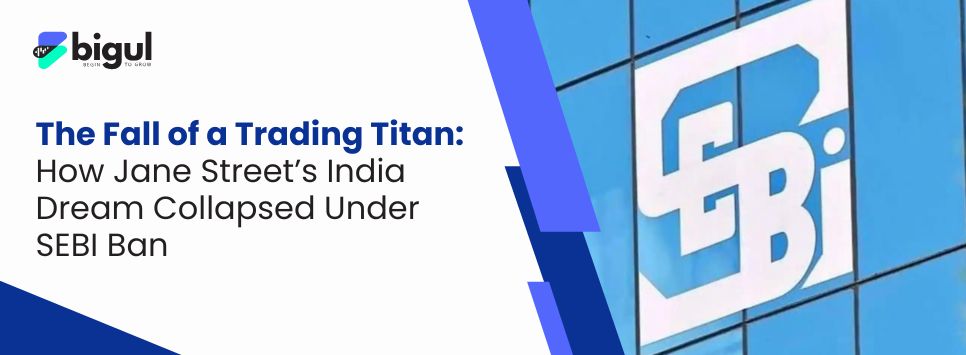The air crackled with tension on Mumbai's Dalal Street when SEBI's thunderbolt struck on July 3, 2025. India's market watchdog delivered a devastating verdict: Jane Street Group, the $4.3 billion quantitative trading behemoth, faced complete expulsion from Indian markets. In an unprecedented move that sent shockwaves through global finance, SEBI froze Rs4,843 crore ($570 million) of Jane Street's assets while accusing its Indian operations of "systemic market manipulation." This SEBI BAN didn't just punish a corporate entity—it exposed how even the most sophisticated players can cross ethical lines in pursuit of profit.
The Rise and Stumble of a Trading Titan
To grasp the magnitude of this fall, consider Jane Street's trajectory. Founded in 2000, the New York-based firm grew into a global trading powerhouse renowned for mathematical precision. Their 2018 India entry promised cutting-edge liquidity and efficiency. "Jane Street India brought algorithmic sophistication we hadn't seen," recalls former NSE executive Priya Mehta. "Their initial years saw legitimate market-making that earned regulator trust."
But beneath the surface, trouble brewed. By 2023, SEBI's surveillance systems detected abnormal patterns in Bank Nifty derivatives. "We noticed synchronised trades creating artificial price movements," reveals a SEBI official speaking anonymously. "The scale suggested institutional involvement." This marked the beginning of a 28-month investigation that would culminate in the seismic SEBI NEWS that rocked global finance.
Decoding the Manipulation Machinery
SEBI's 105-page order details how Jane Street India weaponized its market dominance:
Phase 1: The Morning Mirage (9:15 AM - 12:30 PM)
Jane Street executed massive buy orders for Bank Nifty futures while simultaneously building enormous short positions in Bank Nifty options. On January 17, 2024:
-
Rs4,370 crore in futures purchases artificially inflated the index
-
Rs32,115 crore in options sales positioned them for a downturn
-
Retail traders, seeing the rising index, piled into bullish bets
Phase 2: The Afternoon Collapse (1:15 PM - 3:30 PM)
Like clockwork, Jane Street reversed course:
-
Dumped futures worth Rs5,372 crore, triggering panic selling
-
Bank Nifty plunged 2.3% in 90 minutes
-
Profited Rs734 crore from bearish options as retail portfolios bled
The Expiry Day Gambit
On critical monthly settlement days, Jane Street executed "marking the close" maneuvers. July 10, 2024's final hour saw:
-
Concentrated sales of Rs2,800 crore in futures
-
Artificially suppressed settlement prices
-
Rs225 crore in instant profits
"These weren't isolated incidents," emphasizes SEBI's order. "They formed a pattern of deception spanning 18 months."
The Human Toll: Shattered Dreams and Lost Livelihoods
Behind SEBI's cold statistics lie devastated lives:
NSE Data Reveals
-
84% of options traders lose money monthly
-
Retail participation surged 300% since 2021
-
On manipulated days, retail losses spiked 47%
SEBI explicitly noted profits were "extracted from retail participants" through "predatory trading patterns." For every Rs100 crore Jane Street gained, SEBI estimates Rs35 crore came directly from small investors' accounts.
Unravelling this scheme required digital forensic prowess:
The Digital Paper Trail
-
Analyzed 9.2 billion order entries across 18 months
-
Traced 42 offshore entities funneling capital to Jane Street India
-
Detected algorithm "fingerprints" linking trades
A February 2025 NSE warning letter proved decisive. When Jane Street promised compliance but resumed manipulation within weeks, it demonstrated "willful disregard for Indian regulations," per SEBI.
SEBI collaborated with:
-
U.S. SEC (Securities and Exchange Commission)
-
MAS (Monetary Authority of Singapore)
-
FCA (UK Financial Conduct Authority)
This multinational effort exposed how Jane Street used offshore entities to amplify firepower.
Global Shockwaves: From Wall Street to Dalal Street
The immediate market reactions to the SEBI BAN were severe and far-reaching. Nuvama Wealth, Jane Street’s local partner, saw its shares plunge 7% overnight, while broader fears of regulatory tightening dragged Indian fintech stocks down 3.2%. Panic surged through derivatives markets, with the Volatility Index (VIX) spiking 18% as traders braced for uncertainty. Industry leaders swiftly framed the move as a watershed moment.
Jane Street, however, struck a defiant tone with its terse response: "We disagree with findings and will defend vigorously." The firm now faces a daunting legal labyrinth, with SEBI’s enforcement arsenal already deployed—funds frozen in 14 bank accounts, a complete trading ban on 27 entities, and the looming threat of a potential Rs10,000+ crore penalty in the final order. Historical precedents offer little comfort; while SEBI barred Deutsche Bank for manipulation in 2012 and fined Goldman Sachs in 2021, securities lawyer Zia Mody admits none approach Jane Street’s scale, calling this "uncharted territory." Yet within the turmoil lie silver linings for India’s markets. SEBI is implementing strengthened safeguards like real-time AI surveillance, stricter FPI disclosures, and expiry-day trading curbs alongside retail empowerment initiatives such as mandatory manipulation-awareness tutorials and simplified risk disclosures.
The saga forces an ethical crossroads, challenging the industry to ask when algorithmic efficiencies become predatory, whether profit should override market ethics, and how regulators can stay ahead of quantitative ingenuity—questions that will reshape finance far beyond Jane Street India.
The Future: Rebuilding Trust in Algorithmic Trading
Despite the turmoil, quant trading isn't disappearing:
-
India's derivatives market will grow to $10 trillion by 2030
-
SEBI welcomes "compliant" algorithmic players
-
New guardrails ensure strategies benefit markets holistically
As Mumbai's markets reopen each morning, the SEBI BAN on Jane Street serves as a permanent cautionary monument—a reminder that in finance's temple, the twin pillars of innovation and integrity must forever stand together. For India's 10 crore investors, that balance isn't just regulatory jargon; it's the bedrock of their financial dreams.

.jpg)

.jpg)




.jpg)


